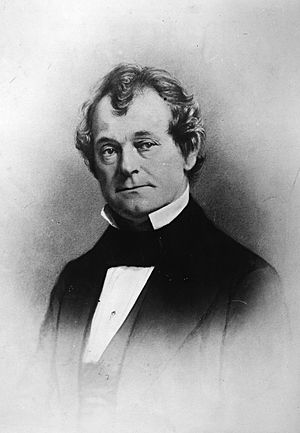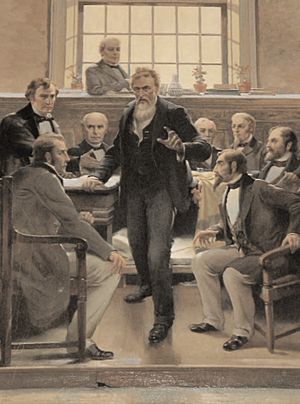Andrew Hunter (lawyer) facts for kids
Quick facts for kids
Andrew H. Hunter
|
|
|---|---|
 |
|
| Member of the Virginia House of Delegates from the Jefferson County district |
|
| In office December 7, 1846-December 3, 1848 |
|
| Preceded by | William F. Turner |
| Succeeded by | Joseph F. McMurran |
| In office December 2, 1861-September 6, 1863 |
|
| Preceded by | John T. Gibson |
| Succeeded by | Jacob S. Melvin |
| Member of the Virginia Senate from the Berkeley and Jefferson Counties district |
|
| In office 1864-March 15, 1865 |
|
| Preceded by | Edwin L. Moore |
| Succeeded by | n/a |
| Personal details | |
| Born | March 22, 1804 Martinsburg, West Virginia, (then Virginia) U.S. |
| Died | November 21, 1888 (aged 84) Charles Town, West Virginia, U.S. |
| Alma mater | Hampden-Sydney College |
| Occupation | Lawyer |
Andrew H. Hunter (born March 22, 1804 – died November 21, 1888) was an important lawyer and politician in Virginia. He served in both parts of the Virginia General Assembly, which is like the state's parliament. He is most famous for being the main lawyer (called the Commonwealth's attorney) for Jefferson County, Virginia. In this role, he led the legal case against John Brown after his famous raid on Harpers Ferry.
Contents
Early Life and Education
Andrew Hunter was born in 1804 in Martinsburg, which was then part of Virginia. His father, David Hunter, was a county clerk for a long time. Andrew came from a family that could afford a good education.
- He attended Washington Academy, which is now Washington and Jefferson College.
- He then went to Hampden-Sydney College, graduating with top honors in 1822.
Andrew Hunter married Elizabeth Ellen Stubblefield. They had two sons, Henry Clay Hunter and Andrew Hunter Jr., and seven daughters.
Views on Slavery
During Andrew Hunter's time, slavery was a major issue in the United States, especially in Virginia. Like many politicians in Virginia, Hunter supported slavery in public discussions. He believed it was beneficial to both white people and enslaved people. He also opposed laws that tried to stop the international slave trade.
Even though he supported slavery, one newspaper described him as a "warm friend" of Horace Greeley, who was an abolitionist (someone who wanted to end slavery). This shows how complex political views could be at the time.
A Career in Law and Politics
Andrew Hunter became a lawyer in Virginia in 1828. He practiced law in the area that is now the Eastern Panhandle of West Virginia. He first worked in Harpers Ferry before settling in Charles Town, the main town of Jefferson County.
Working with Railroads
Starting in 1840, Hunter became a local lawyer for the Baltimore and Ohio Railroad (B&O). He helped the railroad get permission to build tracks in the county, especially for the connection at Harpers Ferry. He also served as a director for the Winchester and Potomac Railroad.
Serving in Virginia's Government
Hunter was chosen by voters in Jefferson County to represent them in the Virginia House of Delegates in 1846. This was a part-time job. He also continued to work for the B&O Railroad while in Richmond, the state capital.
In 1850, Hunter was elected to the Virginia Constitutional Convention of 1850. This was a special meeting to write a new state constitution. He was known for supporting "states' rights," which meant states should have more power than the federal government.
Hunter also served as the personal lawyer for Virginia's governor, Henry A. Wise.
The Famous John Brown Trial
Charles Town, where Hunter lived, was very close to Harpers Ferry. In 1859, John Brown's raid caused a huge national stir. Governor Henry A. Wise asked Andrew Hunter to lead the legal case against John Brown and his group. The local prosecutor needed help with such a major case.
Hunter quickly prepared the charges and argued the case against John Brown. He accused Brown and his followers of murder and other serious crimes against Virginia. Hunter was praised for his skill in court, even though he was up against some very talented lawyers from the North.
- The defendants were found guilty of the charges.
- All of them were sentenced to death and were executed by hanging.
After the trial, Hunter was in charge of everything related to John Brown in his final month. He read all of Brown's letters and made sure he was treated well in jail. The John Brown trials made Andrew Hunter a nationally recognized lawyer. He was considered one of the leading attorneys in the United States at that time.
Years later, in 1881, Hunter even went to hear Frederick Douglass speak about John Brown and congratulated him. Hunter himself said that Brown "was the bravest man I ever saw."
During the Civil War
When the American Civil War began and Virginia left the United States, Andrew Hunter supported the Confederacy. He was a trusted friend and advisor to General Robert E. Lee.
- Hunter represented Jefferson County in the Virginia House of Delegates for two terms (1861-1863).
- Later, he became a State Senator for his district.
During the war, Union General David Hunter, who was Andrew Hunter's cousin, ordered his soldiers to burn Andrew Hunter's home. Andrew Hunter was then held in prison for a month without any charges.
After the War
After the Civil War ended, Andrew Hunter went back to practicing law. He was still the top lawyer in Jefferson County. He often argued cases against Charles J. Faulkner, another well-known local attorney.
One important case involved the location of the Jefferson County seat. When West Virginia became a new state, the county seat was moved from Charles Town to Shepherdstown. Hunter successfully fought to move it back to Charles Town. He also represented Virginia in a case against West Virginia, trying to get Jefferson and Berkeley counties back for Virginia. However, the U.S. Supreme Court decided against Virginia in 1871.
Death
Andrew Hunter passed away at his home in Charles Town, West Virginia on November 21, 1888. He was 84 years old. He is buried with his family at Zion Episcopal Church in Charles Town. He was survived by two of his daughters. His son, Henry Clay Hunter, who was also a lawyer, had died the year before his father.
Images for kids
-
The Virginia State Capitol in Richmond, Virginia, where important meetings took place in the 1800s.
 | Kyle Baker |
 | Joseph Yoakum |
 | Laura Wheeler Waring |
 | Henry Ossawa Tanner |



